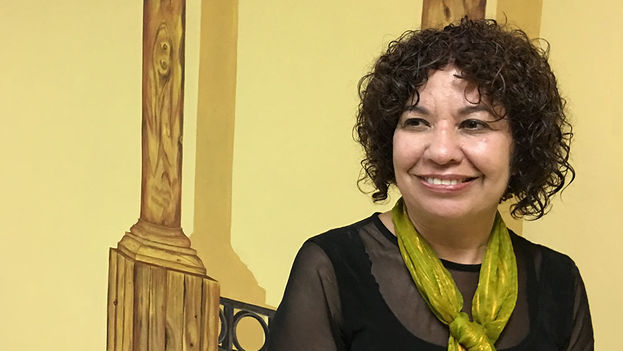
![]() 14ymedio, Reinaldo Escobar, Havana, 18 February 2017 — When one looks at that territory of Cuban literature inhabited by women, it is usually observed from the concept of gender. Among those who study the phenomenon with more intensity, and also with more courage, Ileana Álvarez stands out. She is a poet, essayist, author of a dozen books and deserving of various national and foreign awards.
14ymedio, Reinaldo Escobar, Havana, 18 February 2017 — When one looks at that territory of Cuban literature inhabited by women, it is usually observed from the concept of gender. Among those who study the phenomenon with more intensity, and also with more courage, Ileana Álvarez stands out. She is a poet, essayist, author of a dozen books and deserving of various national and foreign awards.
Recently she left her native province of Ciego de Avila to participate in the Havana Book Fair. In a pause during her tour of La Cabaña fortress, where the event is held, she spoke to 14ymedio and shared with our readers her universe of concerns.
Escobar. What did you think of the Book Fair?
Alvarez. This year I liked it better than the previous one, when there were few books and too much emphasis on the commercial. This one has had very good moments, like the presence of the book My life by Leonardo Padura, but also it has had moments, in my judgment, that are too ideologized. I do not think that the publishing system of a country should be organized according to an annual fair, but it is good that there is an event where we can meet writers from all over the country.
Escobar. What brought you to this Book Fair?
Alvarez. I came to present Sacred Companies. A four-handed essay prepared by my husband Francis Sánchez and myself. It aims to rescue figures of the national intelligentsia converted into permanent company. Like that image of the virgin that always accompanies us, like the talisman that we do not want to be separated from. It focuses on three canons of Cuban literature that were once marginalized, misunderstood: Lezama Lima, Virgilio Piñera and Dulce María Loynaz.
Escobar. How do you feel when you are labeled as a feminist writer?
Alvarez. The term feminist has been very vilified. Patriarchal thinking has helped to discredit it, ridicule it and see it as something of the past. But it must be salvaged by what it has contributed not only to social and civil struggles, but also to the cultural thinking of today’s society. When there was no universal suffrage, feminism was at the forefront of achieving women’s right to vote. By the way, Cuba was one of the first countries to achieve that right, much earlier than other European nations.
Now there are those who believe that all problems are solved because there are laws that protect women and guarantee, on the legal level, equality with men from the point of view of salary and other aspects. But even in the field of laws there is a long way to go and many stereotypes must be fought. A society cannot achieve the true meaning of democracy if real equality between men and women is not achieved.
A society cannot achieve the true meaning of democracy if real equality between men and women is not achieved
Escobar. In addition to being a woman and a feminist, your are a writer based in a province. How do you deal with the pitfalls?
Alvarez. You missed one word: mother. It is difficult to try to equate the status of artist and mother. If we add the “Havana-centrism,” everything becomes more complex. It is hard and difficult. Sometimes I feel tremendously discouraged. Fortunately, in the worst I am supported by an inner strength that is very valuable and that is the faith I have because I am a Catholic. That faith gives me the perseverance of believing that tomorrow can be better if every person contributes their grain of sand.
Escobar. Is the grain of sand you are referring to called “Alas Tensas” (Tense Wings)?
Alvarez. I hope so. Alas Tensas magazine has several goals, perhaps too ambitious given the conditions in which I live. From its pages we want to promote a broader paradigm of Cuban women, which is not reduced to that model of the sensual mulata. Cuban women are also those women living in the countryside who feed the household’s pigs and hens, the old woman who goes to church, the introverted intellectual who looks within. This kind of empowered woman, who prepares for the future, is also an indissoluble part of our identity, our Cuban identity.
Escobar. As a student of letters, what is your diagnosis of the health of Cuban literature in the early 21st century?
Alvarez. It is too early to evaluate that. It takes some distance to analyze these phenomena. There is a very experimental type of poetry, iconoclastic and avant-garde which, even though from my limited personal aesthetics it doesn’t call to me, it is very interesting as a social phenomenon.
I believe that a literature is being made that in the future will have its true emergence. Today we have Leonardo Padura in narrative, or Rafael Rojas in the essay, and other Cuban literature that is written abroad that the critics will have to evaluate more widely. With regards to what is being produced in this century, it remains to be seen what will be considered as literature and what as Cuban, beyond identities banalized by colorism and false folkloricism.
